Colleges and Universities
Best Colleges for Criminal Justice

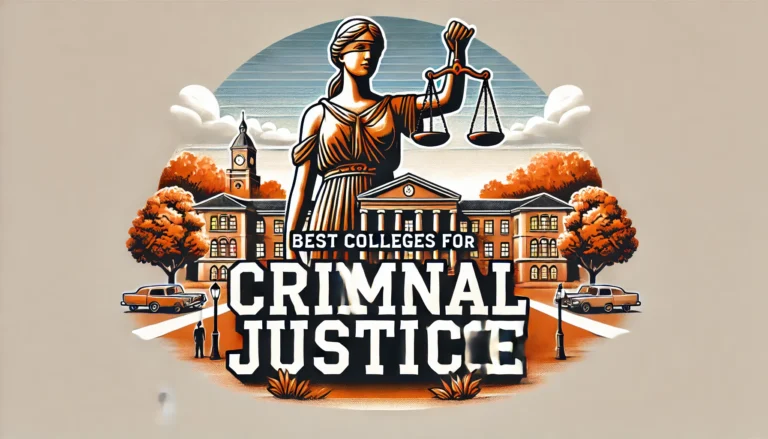
Choosing the right college is crucial for students aspiring to build a successful career in criminal justice. With a wide array of nationwide programs, it can be challenging to determine which institutions offer the best education and opportunities in this field. This article aims to guide prospective students by providing a comprehensive overview of the top colleges for criminal justice. We will explore what a criminal justice major entails, the various career paths it opens up, and the time commitment required to earn this degree. Additionally, we will highlight ten of the best colleges renowned for their criminal justice programs, helping you decide where to pursue your studies. Whether you are interested in law enforcement, forensic science, or legal studies, this guide will provide valuable insights to help you find the perfect college to meet your academic and professional goals.
Description of a Criminal Justice Major
First, let’s delve into what a criminal justice major entails, the variety of job opportunities it offers, and the typical time frame for completing this degree.
What is a Criminal Justice Major
A criminal justice major delves into the intricate workings of the legal system, encompassing law enforcement, court procedures, corrections, and the causes of crime. This comprehensive approach gives students a thorough understanding of how crimes are investigated, prosecuted, and punished, equipping them for diverse careers in police work, corrections, forensic science, and victim advocacy.
Moreover, a criminal justice major also explores the social science aspects of crime, analyzing factors contributing to criminal behavior and identifying potential solutions for creating a safer society. Through this multidisciplinary study, students develop critical thinking skills and gain insights into criminal justice’s practical and theoretical dimensions, preparing them for impactful roles in the justice system.

Applying to a Criminal Justice College?
Hire a professional admissions writer to help you with the application process.
What Jobs Can You Get with a Criminal Justice Major
A criminal justice degree opens the door to various fascinating and rewarding careers. Beyond traditional police work, this field offers opportunities in law enforcement, investigations, forensics, rehabilitation, and more.
Let’s explore the diverse criminal justice jobs you can pursue with a major in this field:
Career Path 🧑💼 | Description 📖 |
Police Officer 👮♂️ | Patrol communities, enforce laws, investigate crimes, and ensure public safety. |
Detective 🕵️♂️ | Conduct in-depth investigations of crimes, collect evidence, and interview suspects. |
Crime Scene Investigator 🔬 | Process crime scenes, collect and analyze evidence, and reconstruct events for court. |
Forensic Scientist 🧪 | Analyze physical evidence in a lab setting to aid criminal investigations. |
Correctional Officer 🏢 | Oversee inmates in jails or prisons, enforce rules, and maintain order. |
Probation/Parole Officer 🔗 | Supervise offenders released from prison or jail, ensuring they meet court-ordered conditions. |
Victim Advocate 💬 | Provide support and resources to victims of crime throughout the legal process. |
Crime Analyst 📊 | Use data and statistics to identify crime trends and assist law enforcement in crime prevention. |
Security Analyst 🔐 | Assess security risks for businesses or organizations and develop strategies to mitigate them. |
Private Investigator 🔍 | Conduct investigations for individuals or businesses, gather information, and track missing persons. |
How Long Does It Take to Get a Criminal Justice Degree
A bachelor’s degree in criminal justice generally requires four years of full-time study. This equates to approximately 120 credits, covering subjects such as criminal law, criminology, forensic science, and the justice system’s workings. Some universities offer accelerated programs or part-time study options, which can alter the completion time to fit individual needs better.
Associate’s Degree in Criminal Justice: This two-year program provides a solid foundation in criminal justice principles, preparing graduates for entry-level roles in law enforcement, corrections, and related fields.
Master’s Degree in Criminal Justice: For those seeking advanced knowledge and specialization, a master’s degree can be obtained in 1-2 years following a bachelor’s degree. Specializations might include forensic science, corrections administration, or leadership within the criminal justice field.
These varied educational pathways allow students to tailor their academic journey to their career aspirations and personal schedules.
10 Best Colleges for Criminal Justice
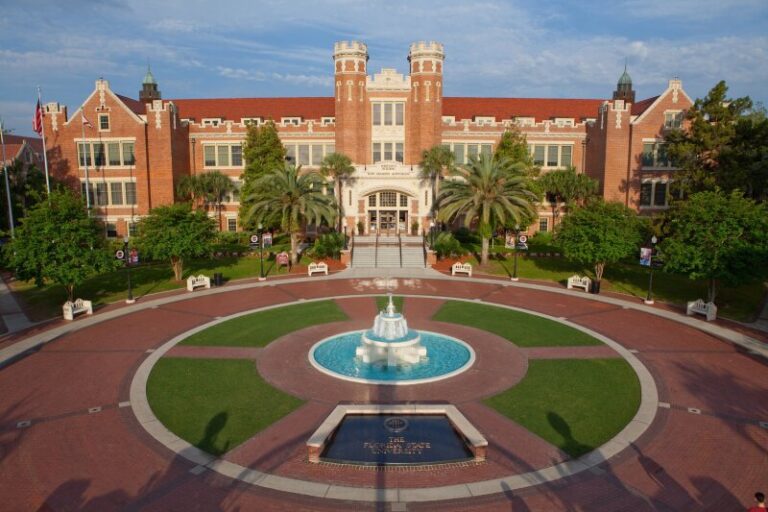
Florida State University (FSU) in Tallahassee stands out as a premier institution for criminal justice education. Home to one of the nation’s oldest and most respected programs, FSU’s College of Criminology and Criminal Justice offers a robust and well-rounded curriculum. The faculty at FSU are leaders in criminological research, blending academic theory with practical insights. Students benefit from learning under these experts, gaining a deep and nuanced understanding of criminal justice. FSU’s strategic location in the state capital provides unparalleled opportunities for internships and research with institutions like the Florida Department of Law Enforcement and local courts, enhancing the educational experience.
Florida State University (Tallahassee, FL)
Key Facts 📊 | Details 💡 |
💰Average tuition fee (in-state) | Around $6,300 Per Year |
📈Acceptance rate | Moderately competitive; around 44% |
🎓Retention rate (freshman year) | 88% |
👥Number of students | Over 41,000 total students |
🎉Scholarships | Yes, FSU offers a variety of scholarships based on merit, need, and specific programs. |

CUNY John Jay College of Criminal Justice is a leader in criminal justice education. Founded specifically for this field, John Jay offers a curriculum designed by experts with professors who are seasoned professionals in law enforcement, forensics, and other criminal justice sectors. Located in New York City, John Jay provides unparalleled access to internships and networking opportunities within the hub of law enforcement and legal institutions. This proximity allows students to gain hands-on experience and build connections with established agencies, making John Jay’s NYC location a giant learning lab where students can witness the criminal justice system.
CUNY John Jay College of Criminal Justice (New York, NY)
Key Facts 📊 | Details 💡 |
💰Average tuition fee (in-state) | Around $6,500 per year |
📈Acceptance rate | 51% |
🎓Retention rate (freshman year) | 78% |
👥Number of students | Around 9,661 undergraduates |
🎉Scholarships | Yes, the university offers a variety of scholarships based on merit, need, and specific programs. |

The University of California, Irvine (UCI) is a top choice for criminal justice studies. Unlike John Jay, UCI leverages its prestigious research university resources to offer a robust program. The curriculum provides a strong foundation in social sciences, allowing students to explore crime’s root causes alongside legal and enforcement procedures. This interdisciplinary approach ensures a comprehensive understanding of the criminal justice system and its societal impacts. UCI’s esteemed criminology faculty engages in cutting-edge research, enhancing the academic experience. Located in Irvine, California, UCI offers valuable internship and research opportunities through its proximity to various criminal justice agencies, while California’s diverse population enriches the educational journey.
University of California, Irvine (Irvine, CA)
Key Facts 📊 | Details 💡 |
💰Average tuition fee (in-state) | Around $14,000 per year |
📈Acceptance rate | Competitive; around 28% |
🎓Retention rate (freshman year) | Data not readily available |
👥Number of students | Over 36,000 total students |
🎉Scholarships | Yes, the university offers a variety of scholarships based on merit, need, and specific programs. |
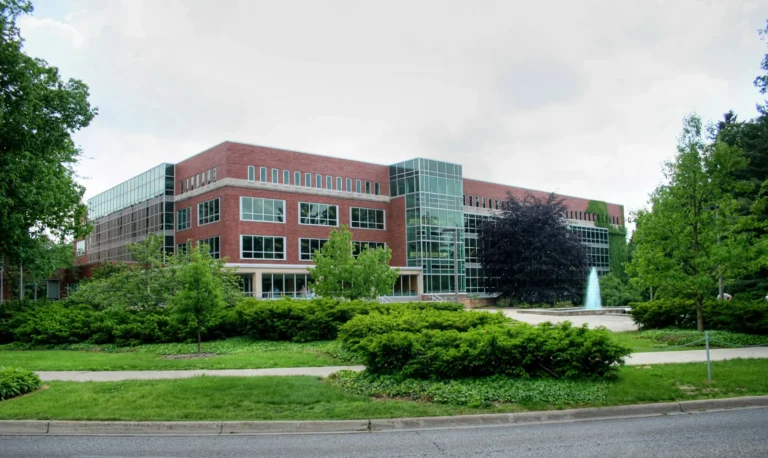
Michigan State University (MSU) offers a compelling program for students seeking a well-rounded criminal justice education. Founded in 1935, MSU’s School of Criminal Justice has a long legacy of excellence. The curriculum equips students with a broad understanding of the criminal justice system, including law enforcement, corrections, courts, and the legal system. MSU’s approach goes beyond legalities, exploring social, political, and economic factors influencing crime and justice. This prepares students to be critical thinkers and problem solvers. Located near the state capital, Lansing, MSU offers access to government agencies, courts, and correctional facilities, providing valuable internship and research opportunities.
Michigan State University (East Lansing, MI)
Key Facts 📊 | Details 💡 |
💰Average tuition fee (in-state) | Around $14,000 per year |
📈Acceptance rate | Moderately competitive; around 71% |
🎓Retention rate (freshman year) | Data not readily available |
👥Number of students | Over 50,000 total students |
🎉Scholarships | MSU offers a variety of scholarships based on merit, need, and specific programs |

Pennsylvania State University (Penn State) at University Park is a top choice for a criminal justice degree, combining a broad liberal arts foundation with specialized coursework. The curriculum covers crime causation theories, crime control policies, and the interplay between law enforcement, courts, and corrections, ensuring graduates have strong critical thinking, communication, and research skills. Penn State’s distinguished faculty brings extensive research and practical experience, offering a well-rounded perspective on the field. Located in University Park, Pennsylvania, the university provides exposure to diverse criminal justice issues and is near major metropolitan areas like Philadelphia and Pittsburgh, offering valuable internship and research opportunities.
Pennsylvania State University (University Park, PA)
Key Facts 📊 | Details 💡 |
💰Average tuition fee (in-state) | Around $18,000 per year |
📈Acceptance rate | Moderately competitive; around 74% |
🎓Retention rate (freshman year) | 88% |
👥Number of students | Over 46,000 total students |
🎉Scholarships | Yes, Penn State offers a variety of scholarships based on merit, need, and specific programs. |
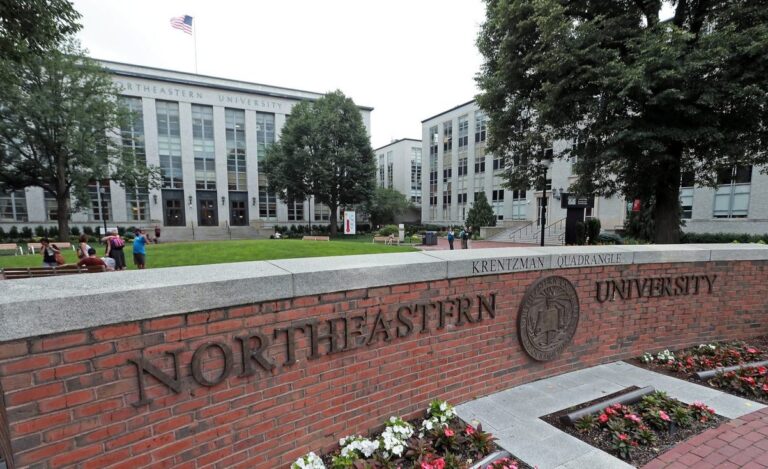
Northeastern University (NU) in Boston offers a unique and compelling approach to criminal justice education, highlighted by its cooperative education program, which integrates classroom learning with professional work experience. Through co-ops with law enforcement agencies, courts, correctional facilities, and other criminal justice organizations, students gain invaluable hands-on experience, test their interests, and build professional connections before graduation. NU’s rigorous curriculum covers theoretical foundations and practical criminal justice applications, guided by expert faculty with real-world experience. Located in Boston, a major hub for law enforcement and legal institutions, NU provides ample internship and networking opportunities, enhancing its strong criminal justice program.
Northeastern University (NU) in Boston
Key Facts 📊 | Details 💡 |
💰Average tuition fee (in-state) | It is not publicly available but is likely as expensive as a private university. |
📈Acceptance rate | Competitive; around 17% |
🎓Retention rate (freshman year) | 89% |
👥Number of students | Over 26,000 total students |
🎉Scholarships | NU offers various scholarships based on merit, need, and specific programs. |

The University of Cincinnati (UC) is a top choice for criminal justice education, featuring a highly respected School of Criminal Justice consistently ranked among the nation’s best by U.S. News & World Report. UC offers a rigorous curriculum designed by experts and delivered by faculty with extensive experience in various criminal justice fields. The program provides comprehensive insights into the social, political, and economic factors influencing crime and justice. With a variety of undergraduate and graduate degrees, students can tailor their education to specific career goals. UC’s location in Cincinnati, a major metropolitan area, offers exposure to diverse criminal justice issues, enhancing the educational experience.
University of Cincinnati (Cincinnati, OH)
Key Facts 📊 | Details 💡 |
💰Average tuition fee (in-state) | Around $11,300 per year |
📈Acceptance rate | Moderately competitive; around 73% |
🎓Retention rate (freshman year) | 78% |
👥Number of students | Over 44,000 total students |
🎉Scholarships | UC offers various scholarships based on merit, need, and specific programs |

Sam Houston State University (SHSU) boasts the oldest PhD program in criminal justice in the US, offering a curriculum enriched by cutting-edge research and a profound understanding of the field’s evolution. Their College of Criminal Justice provides a variety of undergraduate and graduate programs, allowing specializations in areas such as forensics, corrections, and administration. SHSU’s faculty are seasoned professionals who bring practical insights and real-world experience into the classroom. Located in Huntsville, Texas, SHSU offers unique opportunities through its proximity to the Texas Department of Criminal Justice headquarters and correctional facilities, providing exceptional internship and research opportunities.
Sam Houston State University (Huntsville, TX)
Key Facts 📊 | Details 💡 |
💰Average tuition fee (in-state) | Around $7,900 per year |
📈Acceptance rate | Moderately competitive; around 63% |
🎓Retention rate (freshman year) | Not readily available |
👥Number of students | Over 23,000 total students |
🎉Scholarships | SHSU offers various scholarships based on merit, need, and specific programs |
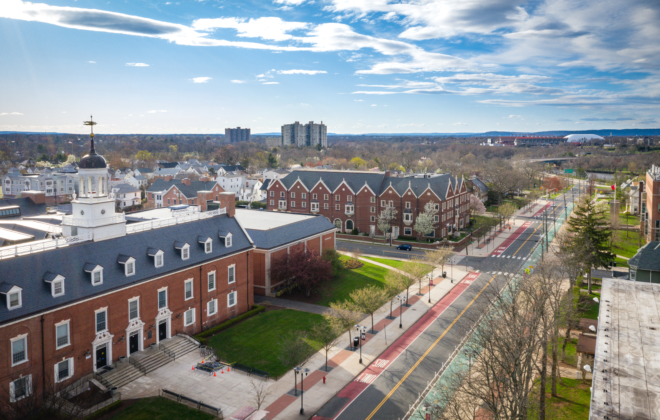
Rutgers University-New Brunswick (RU-NB) boasts a nationally acclaimed School of Criminal Justice staffed by seasoned professionals from law enforcement, forensics, and the justice system. These experts bridge theory and practice, equipping students with practical skills to excel in the field. The curriculum covers the complexities of crime, law enforcement, courts, and corrections, ensuring graduates have a critical understanding and problem-solving abilities. RU-NB’s proximity to New York City offers unparalleled internship opportunities with top agencies, providing hands-on experience and networking prospects. Additionally, New Jersey’s diverse criminal justice landscape enriches the learning experience by exposing students to real-world issues.
Rutgers University-New Brunswick (New Brunswick, NJ)
Key Facts 📊 | Details 💡 |
💰Average tuition fee (in-state) | Around $17,000 per year |
📈Acceptance rate | Moderately competitive; around 63% |
🎓Retention rate (freshman year) | 86% |
👥Number of students | Over 50,000 total students |
🎉Scholarships | Rutgers offers various scholarships based on merit, need, and specific programs. |

The University of Maryland, College Park (UMD) is renowned for its top-ranked graduate program in Criminology, which enhances its stellar undergraduate program. The Department of Criminology and Criminal Justice (CCJS) features faculty who are both accomplished researchers and experienced professionals. Located near Washington, D.C., UMD offers unparalleled access to internships and research opportunities at federal law enforcement agencies and national criminal justice policy organizations. This proximity, combined with Maryland’s diverse range of criminal justice issues, provides a comprehensive education that prepares students for diverse careers in criminal justice.
University of Maryland, College Park (College Park, MD)
Key Facts 📊 | Details 💡 |
💰Average tuition fee (in-state) | Around $31,540 per year |
📈Acceptance rate | Moderately competitive; around 84% |
🎓Retention rate (freshman year) | 95% |
👥Number of students | Over 30,000 total students |
🎉Scholarships | UMD offers various scholarships based on merit, need, and specific programs. |
Wrapping Up
Choosing the right college for a criminal justice major is a critical step toward a successful career. Institutions like CUNY John Jay College of Criminal Justice, the University of California, Irvine, and the University of Maryland, College Park, offer unique advantages and exceptional programs that prepare students for diverse roles within the justice system. Whether the specialized curriculum, distinguished faculty, or strategic location provides valuable internships and research opportunities, these colleges equip students with the knowledge and practical experience necessary to excel in criminal justice careers. By considering these top institutions, you can find the best fit for your academic and professional goals, paving the way for a fulfilling career in criminal justice.

Need Help with a Criminal Justice Essay?
Use an expert service to get a tailored composition quickly and stress-free.
FAQs
What college has the best criminal justice program?
According to U.S. News & World Report, the University of Maryland, College Park, is consistently ranked as having the best graduate program in Criminology, which enhances its stellar undergraduate program. The Department of Criminology and Criminal Justice (CCJS) is renowned for its accomplished faculty and comprehensive curriculum.
Which Cal state has the best criminal justice program?
California State University, Long Beach (CSULB) is often recognized for having one of the best criminal justice programs in the California State University system. CSULB offers a robust curriculum, experienced faculty, and strong connections with local law enforcement agencies, providing students with excellent educational and career opportunities.
What UC has criminal justice?
The University of California, Irvine (UCI) offers a highly regarded criminology, law, and society program. UCI’s interdisciplinary approach combines legal studies with social sciences, comprehensively understanding the criminal justice system. The program is well-respected and provides students with valuable research and internship opportunities.
What is Chico State criminal justice ranked?
California State University, Chico (Chico State) is known for its solid criminal justice program, though it may not be as highly ranked as some other institutions. It offers a well-rounded education focusing on practical experience and a strong connection to local law enforcement and community organizations. While it may not be in the top national rankings, it provides a quality education and promising career preparation for students in the field.
Sources
U.S. News (2024). Best Criminal Law Programs. https://www.usnews.com/best-graduate-schools/top-law-schools/criminal-law-rankings/california?_sort=my_rankings-asc
Niche. 2024 Best Colleges for Criminal Justice in America. https://www.niche.com/colleges/search/best-colleges-for-criminal-justice/

